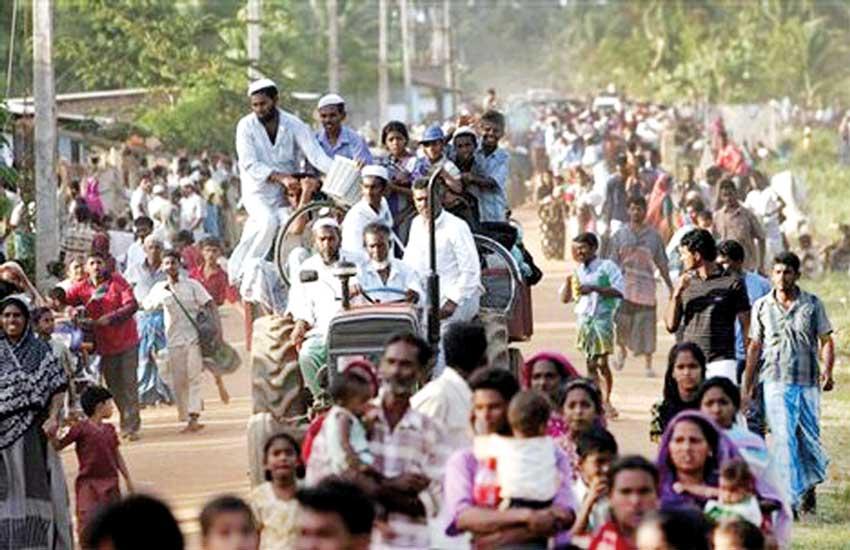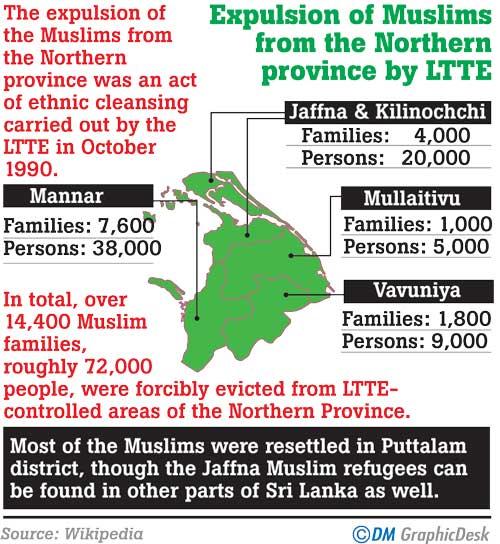Reply To:
Name - Reply Comment

 Over a two-week period in October 1990, the LTTE forcibly expelled 75,000 Muslims from the Northern Province. My family was among them. Most of them were allowed to take only 500 rupees and clothing; some fled with nothing.
Over a two-week period in October 1990, the LTTE forcibly expelled 75,000 Muslims from the Northern Province. My family was among them. Most of them were allowed to take only 500 rupees and clothing; some fled with nothing.
Unable to get any transportation until reaching the towns further South, many walked for days. To date my community’s suffering has not been recognised or redressed. Three decades of neglect and misunderstanding by local residents, government officers, international donors, and Southern Muslims, the Northern Muslims have been left with a feeling that there is no one to trust.
Although the LTTE faced heavy criticism for its ethnic cleansing, leader Velupillai Prabhakaran was conspicuously silent on the issue during peace negotiations from 2002 to 2005. None of the parties engaged in talks – including the Norwegian mediators – considered Northern Muslims’ right to collective return as a precondition. This was the main reason for the low rate of return among the evicted Muslims in comparison to the Internally Displaced Tamil people (IDPs) during the 2002 peace process.

In late 2005, former President Mahinda Rajapaksa promised to appoint a Presidential Commission on the expulsion of the Northern Muslims. At an event commemorating the end of the war in 2009, he stated, “When the innocent Muslims were harassed and forcibly evicted from the North by the LTTE, no one came forward to stop this displacement. Now, with my government in power, having put an end to terrorism, all efforts will be made to resettle the Muslims by May 2010.” This promise went unfulfilled. The former President failed to prioritise Northern Muslims’ right to return in his rapid, post-war nation-building process.
Meanwhile,, when the Northern Muslims began to return after the war, tensions emerged. Unlike the war-displaced Tamils who experienced multiple displacements within the Vanni, the forcibly evicted Muslims were compelled to live away from war-torn home areas and were spared the terrible losses experienced by the Tamils. This led to a competition for resources and distrust among communities that had once been integrated. The situation remained unchanged during the transitional justice period from 2015 to 2019. Early efforts to redress Northern Muslims’ grievances through the proposed mechanisms were abandoned. The OISL Investigation by the Office of the High Commissioner for Human Rights only probed the period from the 2002 February ceasefire until 2011, leaving out earlier crimes such as the 1990 eviction. When the Sri Lankan Government was committed to transitional justice through UNHRC Resolution 30/1, it, in a similar manner, did not commit to addressing earlier events. Northern Muslims took it upon themselves to play an active role in the public hearings led by the Consultation Task Force on reconciliation mechanisms, to no effect. As a result, the current reparation policy does not specifically recognise Northern Muslims’ losses in any form.
The situation today
The Northern Muslims who had already suffered from the 30- years of neglect, now face threats on their basic democratic rights. During the November 2019 Presidential election, those travelling from Puttalam to Mannar, to cast their votes were attacked during the the morning hours. Police detained their buses for hours at Chettikulum that afternoon, disregarding instructions by a member of the Election Commission Prof. Ratnajeevan Hoole to send them home with a police escort. When buses were finally released, they were attacked by the Sinhala mobs in Medawachchiya. The injured women and children did not seek medical treatment, fearing reprisals. No inquiry was held, nor any investigation report released by the Election Commission. Learning from past experience, the Election Commission set up cluster voting booths in Puttalam during the recent Parliamentary Elections, and over 6,000 Mannar voters cast their ballots in Puttalam. Despite this positive development, the Assistant Elections Commissioner has since instructed the District’s Grama Sevekas to register only voters who are permanently living in Mannar, stating there could be no “floating voters,” and people who live in Puttalam must register and vote there.
Government officials consistently argue that the Northern Muslims had integrated well in Puttalam, and they now sought to return solely for business opportunities or to sell their properties. They point out that Northern Muslims had not returned in any significant manner and that only a few have returned for trade, and argue, that they keep one foot in Puttalam and another in the North. Echoing the same sentiment, International donors too do not prioritise the return, arguing that the displaced Muslims are well settled in Puttalam. They rely on a controversial 2004 UNHCR finding that a majority of the displaced Muslims preferred to remain in Puttalam rather than return to their homes in the North—a view that was influenced by the returnees who faced high risks in 2004 when the LTTE remained in control.
It is true that returnees keep a foothold in Puttalam. But that reality simply reflects the obstacles impeding their full- fledge return. With their lands overgrown with shrubs, jungles and uninhabitable, and no prospect of resettlement support, people cannot abruptly leave the places they have lived for 30 years. Not only the fact that there is no basic infrastructure, returnees are not welcomed by Government officers or even their former neighbours, most of whom, after 30 years of separation, do not even recognise them. The few who have fully returned (mostly from Mannar) have done so with decent resettlement assistance and political patronage provided by a former minister who had long prioritised giving publicity to the eviction issues. For most returnees, accessing their lands and providing decent schooling for their children are a daunting experience, leave alone the challenges in accessing livelihood assistance and finding employment opportunities.
At the ground level, political and economic rivalries between Tamil and Muslim communities persist. Non-Muslim religious leaders stoke racist fears that the complete return would alter the ethnic composition of the North, unduly burdening the Tamils who remained and suffered through the war. Muslim returnees, meanwhile, claim that the Government authorities pay little heed to their needs and give preferential treatment to resettled Tamils. They believe senior Government officers under-quote the figures of the returnees, reducing resources allocated for their resettlement. Some returnees have found their village boundaries changed, resulting in the loss of their community rights to land. Government officials have redistributed public lands in these villages – allocated to build public schools, burial grounds, places of worship, playgrounds or even grazing land for animals – to make way for new settlements. Forced to live away from their land for decades, the displaced Muslims have had no say in how these decisions have been made and have suffered additional losses as a result.
The situation is no better in the South. Government officials and Sinhala nationalist commentators often bring up the plight of Northern Muslims when criticising the LTTE or claims to Tamil Eelam. But only a few genuinely consider what happened to those forced to flee and what must be done to find redress. Northern Muslims have faced the same hatred as the broader Muslim community in recent years has undergone. For the hardship experienced during the 30 years and counting, only the politicians of the Northern Muslims consider their plight, while all others ignore it.
Southern Muslim leaders are no exception. While, still reeling from the Easter Sunday attacks, some are questioning Muslim nationalism and urging Muslims to politically assimilate with the Sinhala majority. They criticise ethnic-group politics in the North and East. In 1990, I have heard many Southern Muslims saying that the expulsions of the Muslims were punishment for Northern Muslims who were living like Tamils and not being pious enough toward their faith. These sentiments were repeated during the Friday sermons in certain mosques, where the Imams claimed Allah was punishing the Northern IDPs. What the Southern Muslims failed to understand was that the Tamil Tigers were expelling the Muslims only on the basis of their faith.Northern Muslims not only have a right to practice Islam but also to reclaim their heritage that had linked them to the Northern Tamils for generations; As such, no one has the right to force them to make their choice.
What can be done?
Although, only a handful have been sympathetic towards the issue, the Tamil polity as a whole has long kept silent over the 1990 eviction. In a September 2009 during a meeting with then President Rajapaksa, the Tamil National Alliance (TNA) for the first time publicly raised the issue. When it won the 2013 Northern Provincial Council elections, the TNA appointed a Muslim member to one of their bonus seats as a Councillor. Such overtures were welcomed by the Northern Muslims. In the recent parliamentary election, Muslims of Killinochchi and Jaffna openly endorsed TNA representatives and voted for the TNA. Despite this laudable political move, most Tamil leaders and intellectuals have yet to demonstrate their solidarity with the expelled Northern Muslims.
While the status quo prevails , Muslims are gradually returning to the North without expecting much from anyone, simply in the hope of restarting their lives from scratch and co-existing once again with their Tamil brothers and sisters. They have put forward a few demands, apart from modest ones, for equal treatment, access to their lands, basic livelihood activities and swift clearance of their land that has turned into jungles. It is imperative that Tamil Government officers and politicians in the North recognise that evicted Muslims have the right to reclaim their properties and livelihood opportunities in their native places, irrespective of whether their families choose to continue to live elsewhere. As trust is being built, more Northern Muslims will feel safe to return and reclaim their ancestral lands and cultural heritage. At the moment, however, there seems to be a collective resistance to their return. This is a situation that will only lead to further communal strife between the Muslims and Tamils of the North and benefit only the totalitarianism of the majority community, undermining the long-term interest of the Tamils and their unfulfilled political aspirations. It is in the interest of both communities – with the support of the International community together with the sympathetic Sinhalese – to prioritise intense cooperation and a sustained effort to work through their separate – but intertwined grievances and suffering.